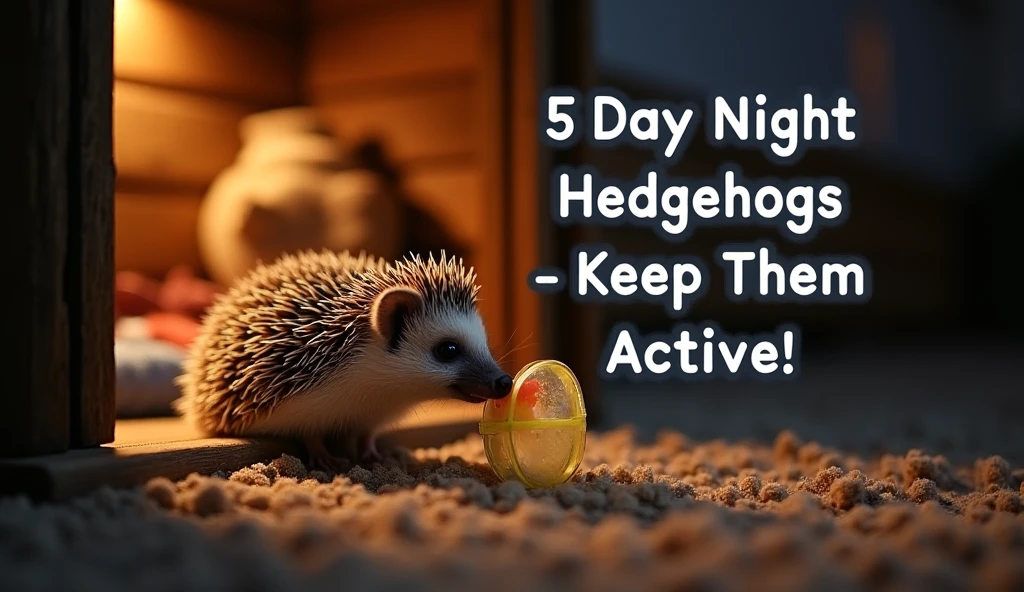Hedgehogs are nocturnal animals, meaning they’re most active during the night. If you own a hedgehog, understanding and supporting their natural sleep-wake cycle is essential for their health and happiness. In this article, you’ll learn how to create a nighttime activity routine for hedgehogs that keeps them engaged, active, and stress-free.

Why Nighttime Routines Matter for Hedgehogs
Hedgehogs are naturally wired to sleep during the day and explore at night. When kept as pets, they still follow this instinct. A consistent evening routine helps:
- Promote physical and mental stimulation
- Reduce boredom and anxiety
- Prevent obesity and health issues
- Strengthen your bond with your hedgehog
Creating a routine also makes care easier for you, as your pet will begin to expect activities at the same time each evening.
What Time Do Hedgehogs Wake Up?
Most hedgehogs wake up around dusk (6–9 PM) and become active into the early morning. To align with their internal clock, it’s best to start their routine in the evening, after sunset or when your home becomes quiet and dim.
Step-by-Step Nighttime Routine for Your Hedgehog
Here’s a sample evening schedule you can follow or adapt to suit your lifestyle and your hedgehog’s preferences.
1. Gentle Wake-Up and Cage Check (6:30 – 7:00 PM)
- Dim the lights or turn on a soft lamp near the cage
- Gently rustle bedding or speak softly to let your hedgehog know it’s time to wake up
- Remove uneaten food and clean any messes from the day
- Refill water and provide fresh food
Tip: Never wake your hedgehog abruptly or during deep sleep. A slow, calm approach helps them feel safe.
2. Feeding Time (7:00 – 7:30 PM)
Offer a fresh evening meal with a mix of:
- High-quality hedgehog kibble or cat food
- Small portions of cooked chicken, insects, or scrambled eggs
- Occasional fruits or vegetables as treats
Feeding at night mimics natural foraging times and gives them energy for upcoming activities.
3. Play and Bonding Time (7:30 – 8:30 PM)
Let your hedgehog out of the cage for supervised playtime in a safe, enclosed area.
Ideas for playtime:
- Use tunnels, boxes, or paper towel rolls to create a small maze
- Let them explore a playpen with toys and treats
- Place a fleece blanket on the floor and let them burrow
Bonding tips:
- Sit with them quietly while they explore
- Let them sniff your hands and crawl on you
- Use a bonding pouch to carry them while watching TV or reading
Pro tip: Keep this time calm and predictable. Avoid loud sounds or sudden movements.
4. Exercise Wheel Time (8:30 PM – 12pm)
A solid-surface exercise wheel is essential. Hedgehogs can run several miles each night, which helps prevent obesity and provides mental stimulation.
Wheel setup tips:
- Ensure the wheel is silent and stable
- Clean it daily to remove waste
- Place it in the cage before nightfall
If your hedgehog is not using the wheel, check for:
- Incorrect wheel size or design
- Health issues like sore feet or obesity
- Boredom from a lack of other stimulation
5. Wind-Down and Nesting (Late Evening – Early Morning)
Once your hedgehog has had enough activity, they’ll naturally return to their nest or sleeping area. Make sure:
- The cage is dark and quiet
- Nesting materials like fleece strips or soft bedding are available
- The room stays between 72–80°F (22–27°C) to prevent hibernation
Let your hedgehog settle in on their own. Avoid handling once they return to sleep mode.
Enrichment Ideas to Rotate Nightly
To keep things interesting, try rotating enrichment activities each night:
| Day | Enrichment Idea |
|---|---|
| Monday | Paper bag filled with treats |
| Tuesday | New tunnel layout |
| Wednesday | Scented toy (with safe herb or cloth) |
| Thursday | Obstacle course made of boxes |
| Friday | Foraging in a dig box (shredded paper) |
| Saturday | Cuddle time in bonding pouch |
| Sunday | Explore a different room (hedgehog-proofed) |
Changing the routine slightly each day keeps your hedgehog curious and mentally active.
Common Mistakes to Avoid
- Too much light: Hedgehogs prefer dim or dark environments at night
- Loud noises: TV, music, or sudden sounds can scare or stress them
- Waking too early: Let your hedgehog wake on its own to avoid stress
- No routine at all: Inconsistent schedules can cause anxiety or inactivity
Final Thoughts: A Happy Hedgehog Is an Active Hedgehog
By following a consistent nighttime activity routine, you’ll help your hedgehog stay healthy, stimulated, and emotionally secure. With gentle handling, enriching activities, and a calm environment, your pet will look forward to every night.
Remember: Patience and consistency are key. Every hedgehog has a unique personality, so adapt your routine to fit their pace and preferences.
